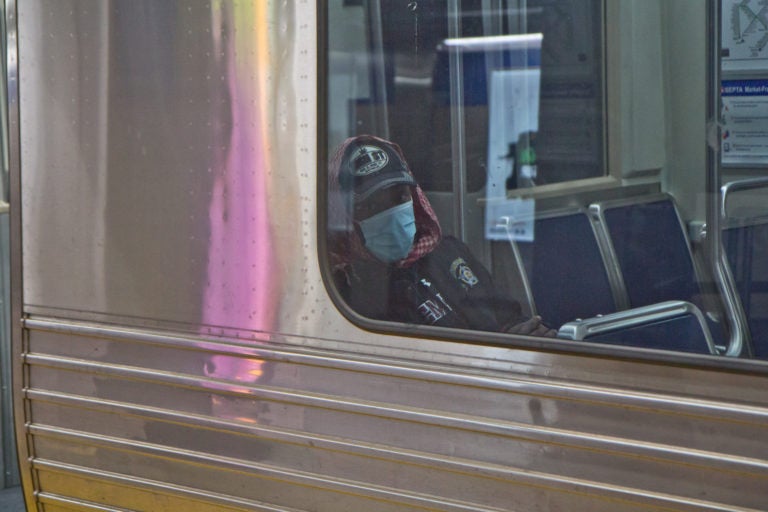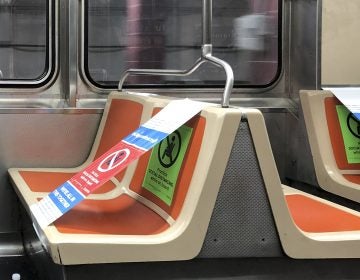SEPTA and Drexel team up to stop the spread of COVID-19 on public transit
Together, the institutions will pursue more than $600,000 in federal funding to develop and test new air and surface cleaning technology.

A SEPTA rider dons a surgical mask. (Kimberly Paynter/WHYY)
Ask us about COVID-19: What questions do you have about the current surge?
SEPTA has launched a partnership with Drexel University aimed at improving efforts to stop the spread of COVID-19 on public transportation.
Together, the institutions will pursue more than $600,000 in federal funding to develop and test new air and surface cleaning technology, SEPTA announced Tuesday.
“This partnership will help keep SEPTA on the cutting-edge of efforts by public transportation systems to battle COVID-19,” said SEPTA General Manager Leslie S. Richards. “SEPTA is extremely fortunate to have a neighbor and partner like Drexel University, and access to their world-renowned research and expertise.”
In cities all over the world, public transit has continued to run throughout the pandemic and public health experts have said the systems can be used safely if precautions are taken. Philadelphia officials have maintained that SEPTA is safe to use as long as riders respect physical distancing rules, wash hands and wear masks.
“There have been no direct links between riding SEPTA and contracting the coronavirus,” Richards said.
Among SEPTA’s workforce, however, there have been 794 confirmed cases of COVID-19 reported, so far, and 423 have returned to work. The authority lists 31 of its work locations as having confirmed cases.
“By partnering with Drexel, SEPTA will be positioned to continue to adapt and add measures to improve the safety of customers and employees,” Richards said.
The partnership will focus on understanding the role of masks, ventilation, air treatment and surface cleaning in preventing transmission of the virus, developing strategies that SEPTA can deploy in the near future and guiding the agency in communicating these new safety protocols.
It will draw on the expertise of faculty from Drexel’s College of Engineering, College of Medicine, College of Nursing and Health Professions and the Dornsife School of Public Health.
The effort will be led by Christopher Sales, a Drexel engineering professor and James Fox, SEPTA’s assistant general manager for system safety.
Sales said the findings will be important for regaining riders’ trust in returning safely to public transportation in the city, and could even help guide policies of similar systems nationwide.
“This is just one of many ways that the pandemic has revealed the strength of our community during times of crisis,” Sales said.
As the COVID-19 pandemic began to take hold in the region, SEPTA ramped up cleaning and sanitization efforts throughout the system. Signage and decals to encourage social distancing are installed in all customer areas and employee facilities, and capacity limits on vehicles have been implemented, though compliance has been questionable.
SEPTA also requires that riders wear a mask on vehicles and at stations and reports a compliance rate of more than 90%.
“Like many public transit agencies and transportation hubs, SEPTA has already made significant changes to protect the health of their riders,” said Aleister Saunders, senior vice provost for research at Drexel. “But evaluating these safety measures and reporting on their effectiveness will be important for assuring riders that they can safely travel on mass transit.”

Get daily updates from WHYY News!
WHYY is your source for fact-based, in-depth journalism and information. As a nonprofit organization, we rely on financial support from readers like you. Please give today.





![CoronavirusPandemic_1024x512[1]](https://whyy.org/wp-content/uploads/2020/03/CoronavirusPandemic_1024x5121-300x150.jpg)



